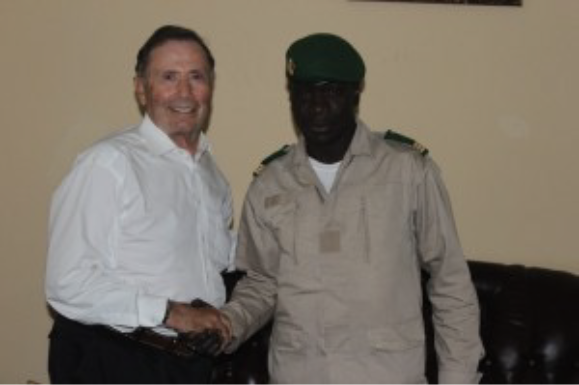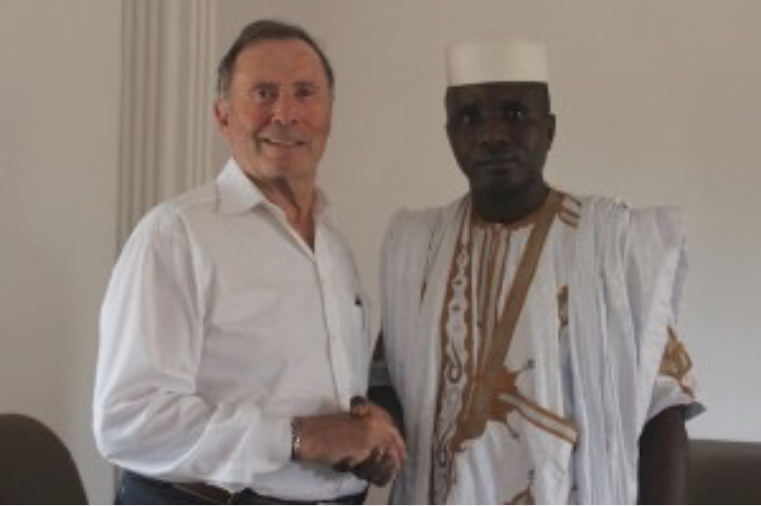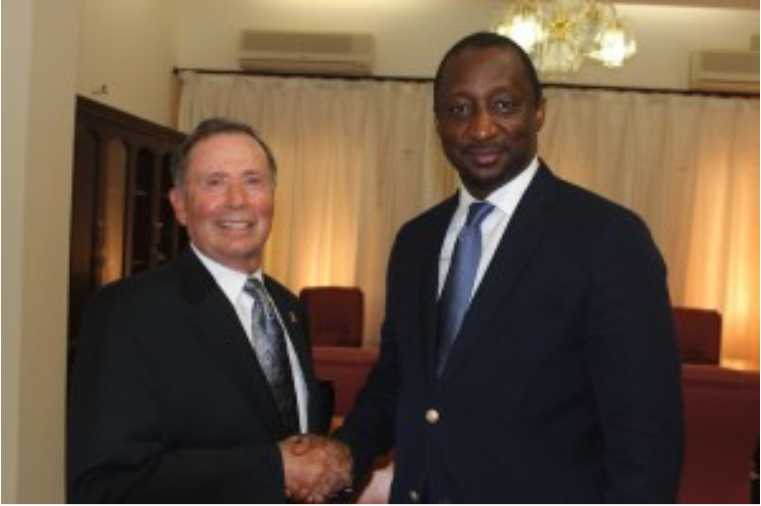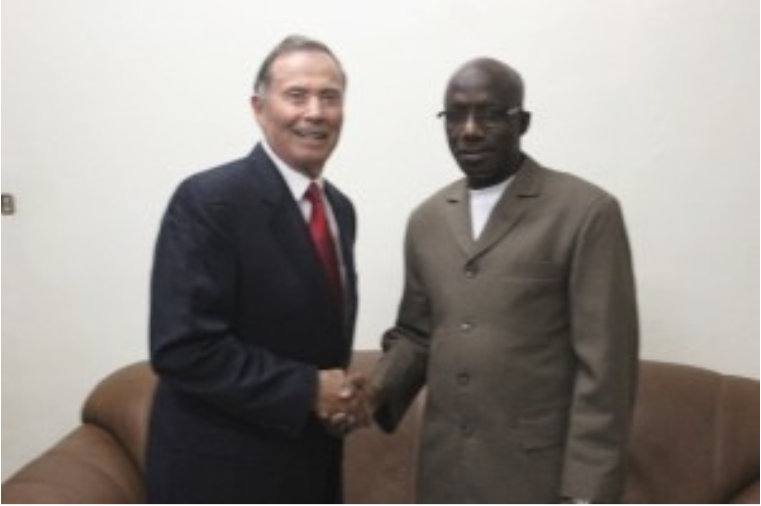“Corrupt Mali government did not intend to hold elections on April 29, 2012″
On September 7, 2012 Yeah Samake, a friend and mayor of the town of Ouelessebougou, arranged for a meeting with Captain Amadou Haya Sanogo. As we weaved through the busy traffic of the capital Bamako, we circuitously reached the nearby foothills, above the pollution. The fresh air cleared my thoughts, and soon reality set in — I was going to meet the man accused of the coup on March 21, 2012. On that day President Amadou Toumani Toure was removed from office, and his corrupt government came to an end.
Driving through the countryside, we soon arrived at the archway of the Kati Military Camp. Samake had a brief exchange with the soldier on guard at the entrance, who directed us into the compound. Following several roadways, and stopping at further checkpoints, we arrived at a barricaded area, our final checkpoint. This narrow twisting alleyway led to an open courtyard, where military personnel waved us on, one giving me a thumbs-up which put me at ease. On entering, what was once a stately colonial house, we waited in the veranda area, where several civilian clad military personnel were watching an American game show. Suddenly from behind, bouncing lively up the three steps leading from the courtyard was a young, fit military officer wearing a green beret, and carrying a wooden baton. I immediately recognized him from his photos in the media. Ushering us into a sitting area, Sanogo turned to me and continued our conversation in English. For a moment I just gazed at Sanogo, many questions racing through my mind.
Sanogo defended his actions as a patriot, saving his country from disaster. He said he knew the elections on April 29, 2012 were not going to happen. The political parties also believed that if there was an election, it would be rigged. Sanogo said that Toure had several fallback plans, since he was not going to give up the presidency. “He was corrupt — and corruption ran deep in his government”. Sanogo stated that he was first and foremost a soldier, and was there to defend the country. He said that Toure obstructed military action in the northern region, where Islamists had taken control of a large area of the country. As commander-in-chief Toure did not support the Malian army. Without arms and military support he was sacrificing his troops. He related how Malian soldiers in the north had been surrounded for over two months without adequate arms, ammunition, and food. On January 22, 2012 almost ninety soldiers were slaughtered by Islamists at the Aguel Hoc Military Camp near Kidal. Toure did not support the military by sending in additional reinforcements. As a result they could not hold their positions in the northern towns and had to retreat, many being killed along the way; leaving precious armaments behind.
Sanogo believes Toure supported the Tuareg fighters coming back from Libya; benefiting financially from the drug trade was not going to fight these Islamists. Sanogo further believes Toure gave these rebels money to destabilize the northern region, to forestall the election process, allowing him to stay in power indefinitely. In addition Toure paid teachers and students to strike periodically, causing further disruption. All these acts were organized to distract people from the real issues of unemployment, instability in the north, food shortages and rampant corruption. In addition the justice system was rigged, and healthcare was not available for most people. “Civil society was suffering” he proffered. The political parties and community leaders had also noticed that the government was not preparing for the elections. Even if the elections took place Toure was in control of the process, and had already picked his successor, Modibo Sidibe a close ally and former prime minister. In any event Sanogo was not going to let this happen to his country. With corruption running deep this was an opportunity to clean house he noted. “We are the future for the Malians — their hope for the future — for the democracy. It was important to have clear and transparent elections”, he proudly stated.
 Captain Amadou Haya Sanogo and Ambassador John Price
Captain Amadou Haya Sanogo and Ambassador John Price
Sanogo also believes that Dioncounda Traore, the constitutional transition president, who was former president of the parliament, wants to continue to stay on as president of Mali. However it was agreed that members of the transitional government would not be eligible in the new presidential election. Sanogo noted that Traore had not asked the Economic Community of West African States (ECOWAS) to lift the embargo on the badly needed arms. “He doesn’t care, or arms would come”. He also noted that several diplomats in Bamako have not fairly communicated his position. “They have been giving out bad information, which is destroying the relationship. As soldiers we have to defend, and be willing to die for the country. I put my life on the line to save the country for the future”. He reminded us that he stepped aside when asked, and emphatically stated, “I have no political ambition, all I have is a new vision for the country”. At the same time he was adamant that he needed to stay close to the transition process, or the democratic elections won’t go forward. “Without watching, there will never be stability”, he noted. He denied reports that he was looking to share power with President Traore. He was disappointed that the international community does not understand his loyalty to the country, and the purpose of his actions. He strongly believes that ninety percent of the population supports his actions. He was emphatic that, “we did it for the country — to save the people”.
He proudly related his seven visits to the U. S. for training, which included Fort Benning, Quantico, and Lackland military bases. He was thankful for the training and supplies provided by the U. S. military. Sanogo finally stated, “Today we have a fresh start for the country, there is hope for the people, schools are operating without corruption and stealing of money by the leaders”. He truly believes he saved the country from disaster. The ousting of Toure was not considered a coup, since it did not include the typical killing of military officers (there were eighty generals) and high ranking political leaders, of which none were harmed, I was told by government leaders.
 Moussa Sinko Coulibaly, Minister of Administration and Ambassador John Price
Moussa Sinko Coulibaly, Minister of Administration and Ambassador John Price
Moussa Sinko Coulibaly, the Minister of Administration and Interior in the transitional government, is in charge of organizing the upcoming elections. Coulibaly was a colonel in the army and a friend of Sanogo. He was the spokesperson for the military junta for a short time. We discussed the issue of whether the events of March 21, 2012 were considered a coup or a mutiny, since that made a difference on how Mali is perceived in the world. The U. S. called it a coup, while the French and ECOWAS accepted it as a mutiny. If it were a coup he noted, the army would have taken control of the government which was not the case. In addition no one in the government or military were killed. Under the direction of ECOWAS a constitutionally mandated transitional government was formed without interference of the military.
In meeting with Tieman Coulibaly, the Minister of Foreign Affairs, he noted that they were operating under the 1992 Constitution. After the events of March 21, 2012 it was temporarily suspended until April 6, when the constitutional court re-established it. On April 12, 2012 Traore was sworn-in as president of the transitional government. “It is important to note that Sanogo decided to step back at the time”, he stated. Sanogo also welcomed Traore back from Paris, where he was recuperating, after an attack by several protesters weeks earlier. Coulibaly stated that “Sanogo is part of the solution today”. In parting he was emphatic that “Mali is still a democracy”.
 S.E.M. Tieman H. Coulibaly, Minister of Foreign Affairs and Ambassador John Price
S.E.M. Tieman H. Coulibaly, Minister of Foreign Affairs and Ambassador John Price
 Yamoussa Camara, Minister of Defense and Ambassador John Price
Yamoussa Camara, Minister of Defense and Ambassador John Price
Defense Minister Yamoussa Camara, a former colonel in the army, gave me his military perspective on Sanogo. I wanted to know what effect his mutinous act had on Mali; how he fit into the structure today. Camara noted that democracy in Mali had been an illusion — not a reality. Corruption was rampant; democracy was not functioning. Daily life was difficult for most Malians, and they were suffering. In a real democracy he noted, checks and balances would have stopped the corruption. However most of the leaders were not willing to stop it. He stated “It is the duty of the military to step-in when no one is doing anything about it”. That is why Sanogo decided to intercede, he noted. Ninety percent of the people were satisfied with what was happening. It was the minority that had been benefiting. When constitutional order was brought about, Sanogo’s National Committee for Recovering Democracy and Restoring the State was abolished. Today Sanogo has no influence over the government. His role is limited to being the leader of a commission for the reform of the army, but has no political role.
Minister Camara stated that he considers Sanogo a National Hero. As a soldier himself, it is why he is lending his support to Mali at this difficult time. “Because of the mutiny we have the opportunity of a new start — so what happened to the country during this dark period, will never happen again”.